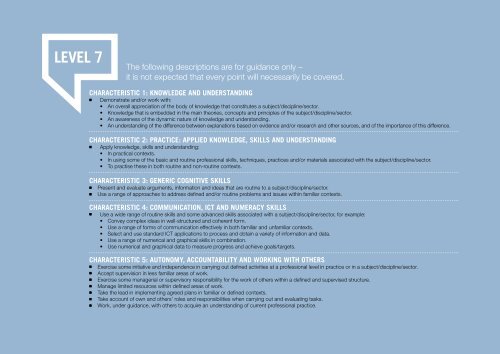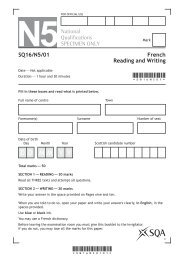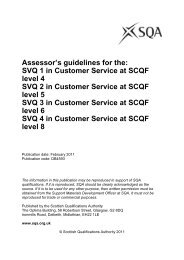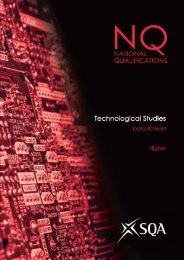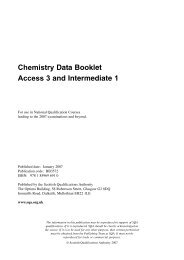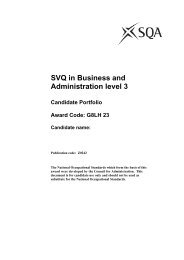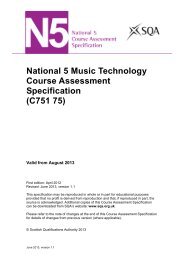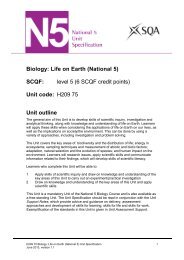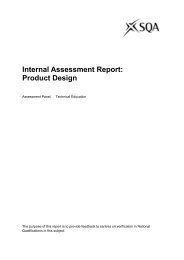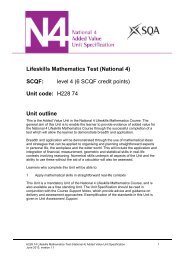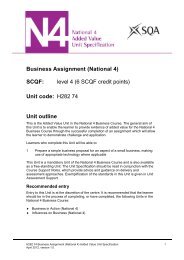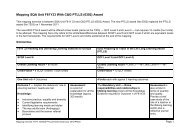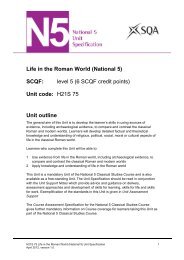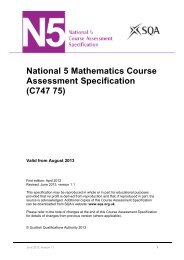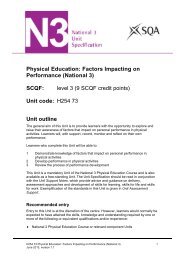Revised SCQF Level Descriptors - Scottish Credit and Qualifications ...
Revised SCQF Level Descriptors - Scottish Credit and Qualifications ...
Revised SCQF Level Descriptors - Scottish Credit and Qualifications ...
You also want an ePaper? Increase the reach of your titles
YUMPU automatically turns print PDFs into web optimized ePapers that Google loves.
LEVEL 7<br />
The following descriptions are for guidance only –<br />
it is not expected that every point will necessarily be covered.<br />
CHARACTERISTIC 1: KNOWLEDGE AND UNDERSTANDING<br />
• Demonstrate <strong>and</strong>/or work with:<br />
• An overall appreciation of the body of knowledge that constitutes a subject/discipline/sector.<br />
• Knowledge that is embedded in the main theories, concepts <strong>and</strong> principles of the subject/discipline/sector.<br />
• An awareness of the dynamic nature of knowledge <strong>and</strong> underst<strong>and</strong>ing.<br />
• An underst<strong>and</strong>ing of the difference between explanations based on evidence <strong>and</strong>/or research <strong>and</strong> other sources, <strong>and</strong> of the importance of this difference.<br />
CHARACTERISTIC 2: PRACTICE: APPLIED KNOWLEDGE, SKILLS AND UNDERSTANDING<br />
• Apply knowledge, skills <strong>and</strong> underst<strong>and</strong>ing:<br />
• In practical contexts.<br />
• In using some of the basic <strong>and</strong> routine professional skills, techniques, practices <strong>and</strong>/or materials associated with the subject/discipline/sector.<br />
• To practise these in both routine <strong>and</strong> non-routine contexts.<br />
CHARACTERISTIC 3: GENERIC COGNITIVE SKILLS<br />
• Present <strong>and</strong> evaluate arguments, information <strong>and</strong> ideas that are routine to a subject/discipline/sector.<br />
• Use a range of approaches to address defined <strong>and</strong>/or routine problems <strong>and</strong> issues within familiar contexts.<br />
CHARACTERISTIC 4: COMMUNICATION, ICT AND NUMERACY SKILLS<br />
• Use a wide range of routine skills <strong>and</strong> some advanced skills associated with a subject/discipline/sector, for example:<br />
• Convey complex ideas in well-structured <strong>and</strong> coherent form.<br />
• Use a range of forms of communication effectively in both familiar <strong>and</strong> unfamiliar contexts.<br />
• Select <strong>and</strong> use st<strong>and</strong>ard ICT applications to process <strong>and</strong> obtain a variety of information <strong>and</strong> data.<br />
• Use a range of numerical <strong>and</strong> graphical skills in combination.<br />
• Use numerical <strong>and</strong> graphical data to measure progress <strong>and</strong> achieve goals/targets.<br />
CHARACTERISTIC 5: AUTONOMY, ACCOUNTABILITY AND WORKING WITH OTHERS<br />
• Exercise some initiative <strong>and</strong> independence in carrying out defined activities at a professional level in practice or in a subject/discipline/sector.<br />
• Accept supervision in less familiar areas of work.<br />
• Exercise some managerial or supervisory responsibility for the work of others within a defined <strong>and</strong> supervised structure.<br />
• Manage limited resources within defined areas of work.<br />
• Take the lead in implementing agreed plans in familiar or defined contexts.<br />
• Take account of own <strong>and</strong> others’ roles <strong>and</strong> responsibilities when carrying out <strong>and</strong> evaluating tasks.<br />
• Work, under guidance, with others to acquire an underst<strong>and</strong>ing of current professional practice.


